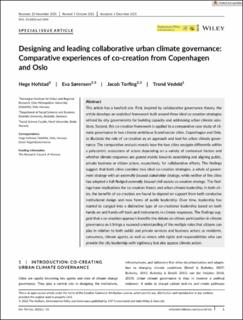Designing and leading collaborative urban climate governance: Comparative experiences of co-creation from Copenhagen and Oslo
Journal article, Peer reviewed
Published version
Permanent lenke
https://hdl.handle.net/11250/2992220Utgivelsesdato
2022-03-28Metadata
Vis full innførselSamlinger
Originalversjon
Environmental Policy and Governance. 2022, online 1-14. https://doi.org/10.1002/eet.1984Sammendrag
This article has a twofold aim. First, inspired by collaborative governance theory, the article develops an analytical framework built around three ideal co-creation strategies utilized by city governments for building capacity and addressing urban climate solutions. Second, this co-creation framework is applied to a comparative case study of climate governance in two climate-ambitious Scandinavian cities, Copenhagen and Oslo, to illustrate the role of co-creation as an approach and tool for urban climate governance. The comparative analysis reveals how the two cities navigate differently within a polycentric ecosystem of actors depending on a variety of contextual factors and whether climate responses are geared mainly towards assembling and aligning public, private business or citizen actors, respectively, for collaborative efforts. The findings suggest that both cities combine two ideal co-creation strategies, a whole of government strategy with an externally focused stakeholder strategy, while neither of the cities has adopted a full-fledged externally focused civil society co-creation strategy. The findings have implications for co-creation theory and urban climate leadership. In both cities, the benefits of co-creation are found to depend on support from both conducive institutional design and new forms of public leadership. Over time, leadership has started to congeal into a distinctive type of co-creational leadership based on both hands-on and hands-off tools and instruments in climate responses. The findings suggest that a co-creation approach benefits the debate on citizen participation in climate governance as it brings a nuanced understanding of the multiple roles that citizens can play in relation to both public and private services and business actors; as residents, consumers, climate agents, as well as voters with rights and responsibilities who can provide the city leadership with legitimacy but also oppose climate action.

